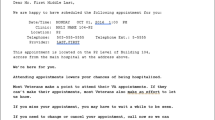Abstract
Background
Non-attendance at outpatient clinics is common and costly.
Aims
This study aimed to determine if sending SMS (‘short message service’ or text message) reminders to patients before appointments reduced non-attendance.
Methods
We collected outpatient data at Ballyfermot and Lucan Community Adult Mental Health Service, Dublin, Ireland during 6-month periods (a) immediately prior to the introduction of SMS reminders for outpatient appointments; (b) immediately following the introduction of SMS reminders; and (c) two and a half years later.
Results
In the 6-month period prior to SMS reminders, 2170 outpatient appointments were offered and there was a 22.2% non-attendance rate. In the 6-months following the introduction of SMS reminders, 2092 appointments were offered and the non-attendance rate fell to 13.9% (p < 0.001), with the lower non-attendance rate among those who did not receive SMS reminders (9.7%) rather than those who did (15.7%) (p = 0.0002). There were 98 appointment cancellations during this period (73% via SMS messaging). In the 6-month period two and a half years after the introduction of SMS reminders, 2474 appointments were offered and the non-attendance rate rose to 19.3%; this did not differ between those who received SMS reminders (19.3%) and those who did not (19.1%) (p = 0.38209) and was still lower than the rate prior to SMS reminders (p = 0.01321). During this period, 197 appointments were cancelled (75% via SMS messaging).
Conclusions
The chief value of SMS reminders lies not in reminding patients of appointments but in providing a convenient way to cancel them, thus allowing more appointments to be offered.
Similar content being viewed by others
References
Kelly B (2017) Mental Health in Ireland. The Complete Guide for Patients, Families, Health Care Professionals and Everyone Who Wants To Be Well. Liffey Press, Dublin
National Audit Office (2014) NHS waiting times for elective care in England. National Audit Office, London
Karter AJ, Parker MM, Moffet HH et al (2004) Missed appointments and poor glycemic control: an opportunity to identify high-risk diabetic patients. Med Care 42:110–115. https://doi.org/10.1097/01.mlr.0000109023.64650.73
Gurol-Urganci I, de Jongh T, Vodopivec-Jamsek V et al (2013) Mobile phone messaging reminders for attendance at healthcare appointments. Cochrane Database Syst Rev. https://doi.org/10.1002/14651858.CD007458.pub3
Guy R, Hocking J, Wand H et al (2012) How effective are short message service reminders at increasing clinic attendance? A meta-analysis and systematic review. Health Serv Res 47:614–632. https://doi.org/10.1111/j.1475-6773.2011.01342.x
Sims H, Sanghara H, Hayes D et al (2012) Text message reminders of appointments: a pilot intervention at four community mental health clinics in London. Psychiatr Serv 63:161–168. https://doi.org/10.1176/appi.ps.201100211
Sanghara H, Kravariti E, Jakobsen H, Okocha C (2010) Using short message services in mental health services: assessing feasibility. Ment Health Rev J 15:28–33
Miller BJ, Stewart A, Schrimsher J et al (2015) How connected are people with schizophrenia? Cell phone, computer, email, and social media use. Psychiatry Res 225:458–463. https://doi.org/10.1016/j.psychres.2014.11.067
Kirkpatrick B (2014) Progress in the study of negative symptoms. Schizophr Bull 40:S101–S106. https://doi.org/10.1093/schbul/sbt158
Buchanan RW (2007) Persistent negative symptoms in schizophrenia: an overview. Schizophr Bull 33:1013–1022. https://doi.org/10.1093/schbul/sbl057
Pijnenborg GHM, Withaar FK, Brouwer WH et al (2010) The efficacy of SMS text messages to compensate for the effects of cognitive impairments in schizophrenia. Br J Clin Psychol 49:259–274. https://doi.org/10.1348/014466509X467828
Acknowledgements
We wish to acknowledge the administration staff at Ballyfermot and Lucan Community Mental Health Team.
Author information
Authors and Affiliations
Corresponding author
Ethics declarations
Conflict of interest
The authors declare that they have no conflict of interest.
Ethical approval
Ethical approval was not obtained, as there was no patient contact at any time.
Rights and permissions
About this article
Cite this article
Moran, L., O’Loughlin, K. & Kelly, B.D. The effect of SMS (text message) reminders on attendance at a community adult mental health service clinic: do SMS reminders really increase attendance?. Ir J Med Sci 187, 561–564 (2018). https://doi.org/10.1007/s11845-017-1710-0
Received:
Accepted:
Published:
Issue Date:
DOI: https://doi.org/10.1007/s11845-017-1710-0




